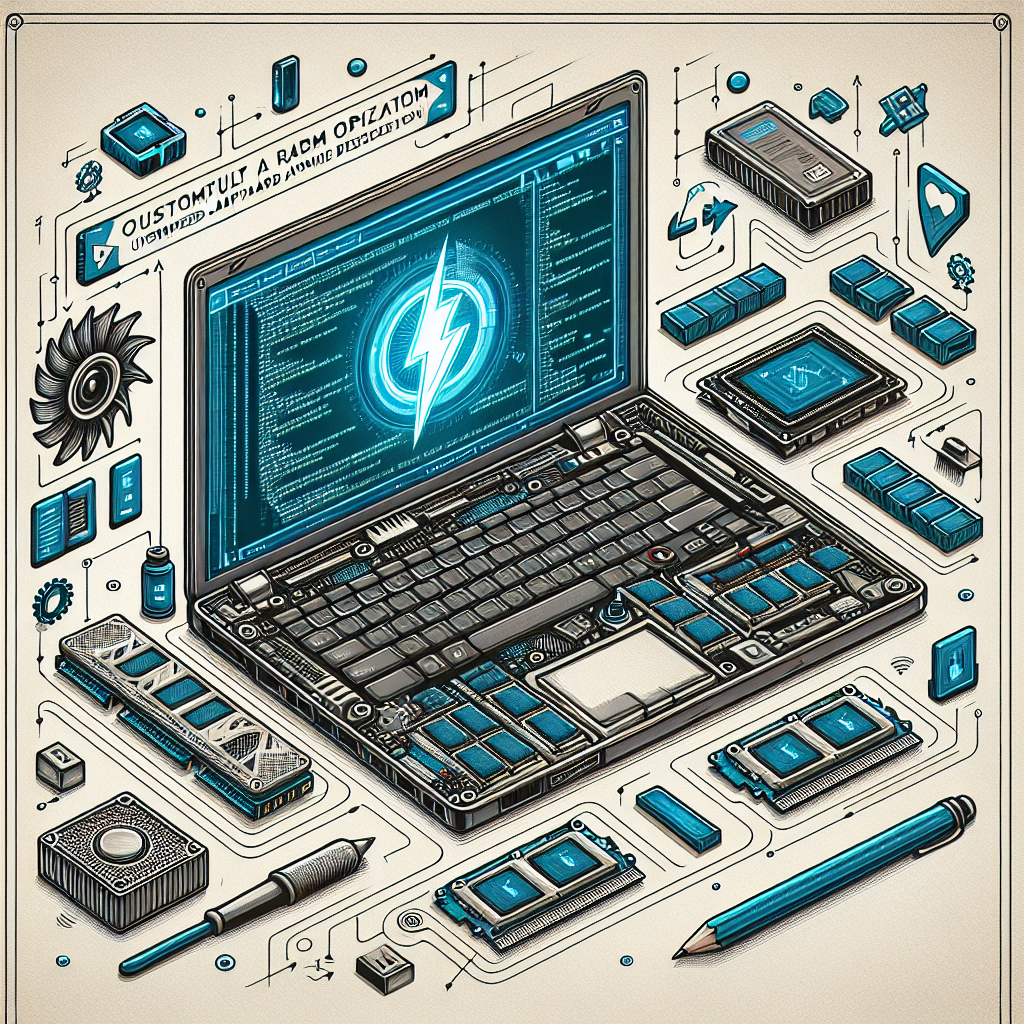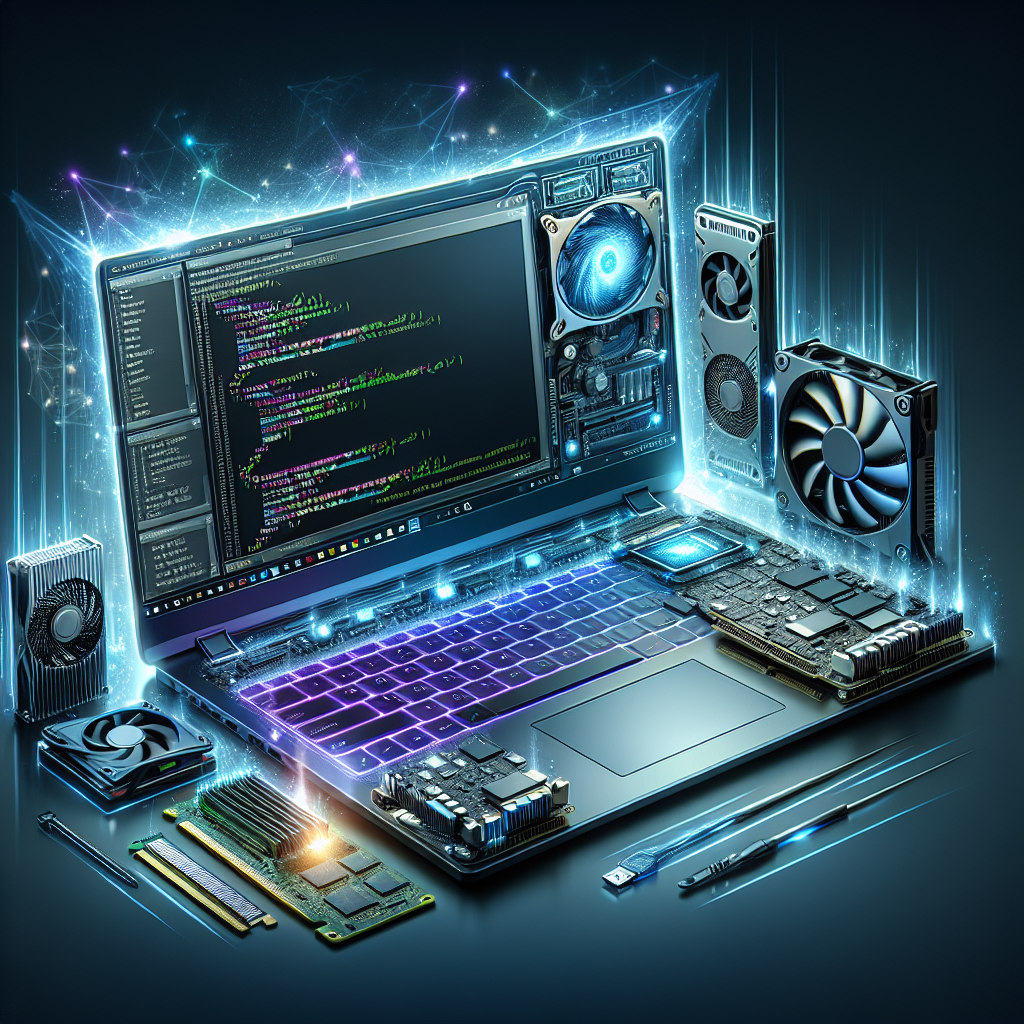So, you’re a software developer, huh? Well, you’ve come to the right place because this article is all about custom laptop optimization specifically tailored for your needs. We all know how essential a reliable laptop is for your work, and nothing can be more frustrating than a slow and inefficient machine when you’re knee-deep in code. That’s why it’s time to discover the secrets of optimizing your laptop to supercharge your productivity and unleash your full coding potential. From hardware upgrades to software tweaks, we’ve got you covered. Let’s dive right in and unlock the power of your laptop!

Understanding The Needs Of A Software Developer
Developing software requires a combination of skills, knowledge, and the right tools. One of the most important tools for a software developer is a reliable laptop that meets their specific needs. In this article, we will explore the importance of good hardware, the specific hardware needs for programming, and how the needs of different types of developers can vary.
Importance of Good Hardware
When it comes to software development, having good hardware is essential. A powerful and efficient laptop can greatly enhance your productivity and make the development process much smoother. Good hardware ensures that your laptop can handle the demands of running multiple programs and applications simultaneously, compiling code quickly, and handling large datasets efficiently.
Specific Hardware Needs for Programming
Software developers have specific hardware needs that differ from those of regular computer users. The most important factors to consider when choosing a laptop for programming include the processor, RAM, storage, display, graphics card, and operating system. Each of these components plays a crucial role in the performance and efficiency of your laptop for coding purposes.
Comparing the Needs of Different Types of Developers
It’s important to understand that the needs of software developers can vary depending on their specific field or specialization. For example, a web developer might require different hardware specifications compared to a data scientist or a game developer. Understanding the specific requirements of your field can help you make a more informed decision when choosing a laptop for software development.
Choosing The Right Laptop For Software Development
Now that we understand the importance of good hardware and the specific needs of software developers, let’s dive into the factors to consider when buying a laptop for programming, comparing popular laptop models, and understanding the necessary specifications.
Factors to Consider When Buying a Laptop
When buying a laptop for software development, there are several factors to consider. The most important ones include the processor, RAM, storage, display, graphics card, and operating system. It’s essential to strike a balance between these components to ensure optimal performance and efficiency.
Comparing Popular Laptop Models
With a wide range of laptop models available on the market, it can be overwhelming to choose the right one for your needs. Popular choices among software developers include the MacBook Pro, Dell XPS, and Lenovo ThinkPad series. Each of these models has its own strengths and weaknesses, and it’s important to consider your specific requirements.
Understanding the Specifications Needed
To ensure a smooth and efficient programming experience, it’s crucial to understand the necessary specifications for your laptop. A powerful processor, sufficient RAM, fast storage, a high-resolution display, and a capable graphics card are all important factors to consider. The specific requirements will depend on the type of programming you do and the software tools you use.
Processor Selection for Optimal Performance
The processor is the brain of your laptop, and it plays a crucial role in the performance of your programming tasks. Understanding processor speed, the role of multi-core processors, and the recommended processors for developers is essential when choosing the right laptop for software development.
Understanding Processor Speed
Processor speed, measured in gigahertz (GHz), determines how fast your laptop can execute tasks. A higher processor speed means faster code compilation, quicker program execution, and a more responsive user experience. However, it’s important to note that processor speed alone is not the only factor that determines overall performance.
Role of Multi-Core Processors
Multi-core processors have become the norm in modern laptops, and they offer significant benefits for software development. These processors have multiple cores, allowing the laptop to handle multiple tasks simultaneously. This is particularly useful for software developers who often run multiple programs or virtual machines at the same time.
Recommended Processors for Developers
When choosing a laptop for software development, it’s recommended to opt for a processor from Intel’s Core i7 or AMD’s Ryzen series. These processors offer excellent performance and are capable of handling the demands of modern programming tasks. However, the specific processor you choose should align with your budget and the nature of your programming work.
Optimizing RAM for Faster Code Execution
RAM, or Random Access Memory, plays a critical role in how quickly your laptop can execute code. Understanding the benefits of higher RAM for programming, the recommended RAM size for coding, and the effect of RAM speed on programming efficiency will help you optimize your laptop for faster code execution.
Benefits of Higher RAM for Programming
Having more RAM allows your laptop to store and access larger amounts of data quickly. This is particularly important for software developers who work with complex algorithms, large datasets, or multiple programs simultaneously. Higher RAM capacity ensures smoother multitasking, faster program compilation, and improved overall performance.
Recommended RAM Size for Coding
The recommended minimum RAM size for programming is 8GB, although 16GB or more is often preferred for optimal performance. With larger RAM capacity, you can handle more demanding tasks without experiencing lag or slowdowns. Investing in more RAM is a worthwhile investment, particularly if you work with memory-intensive programming languages or large databases.
Effect of RAM Speed on Programming Efficiency
In addition to RAM size, the speed of the RAM modules also impacts programming efficiency. Faster RAM modules allow for quicker data access and retrieval, which can significantly improve the speed of code execution. When choosing RAM for your laptop, it’s important to consider both the size and speed to ensure optimal performance.

Storage Decisions: SSD vs HDD
Choosing the right type of storage for your laptop is an important decision for software developers. Understanding the difference between SSD (Solid-State Drive) and HDD (Hard Disk Drive), the advantages of SSD for developers, and the recommended SSD size will help you make an informed choice.
Understanding the Difference Between SSD and HDD
The main difference between SSD and HDD lies in the technology used to store and retrieve data. HDDs use spinning disks and magnetic heads, while SSDs use flash memory. SSDs offer significantly faster data read and write speeds, lower power consumption, and better durability compared to HDDs.
Advantages of SSD for Developers
SSDs are highly recommended for software developers due to their superior performance. Faster data access speeds mean that your programs will load quicker, and file operations such as saving and copying will be much faster. This can greatly enhance your productivity and allow you to focus more on coding rather than waiting for tasks to complete.
Recommended SSD Size for Developers
When it comes to the recommended size for an SSD for software development, it’s best to go for at least 256GB or higher. This will provide sufficient space for your operating system, programming tools, and projects. However, if you work with large datasets or require extensive storage, opting for a larger SSD or combining it with external storage solutions might be necessary.
Importance of a Good Display
Having a good display is often overlooked but plays a crucial role in software development. Understanding the importance of resolution and screen size, the impact of a good display on coding, and the recommended display specifications will help you choose a laptop with a display that enhances your programming experience.
Understanding Resolution and Screen Size Importance
Resolution refers to the number of pixels a display can show, while screen size refers to the physical dimensions of the display. A higher resolution allows for more screen real estate, which is beneficial for coding as it enables you to see more code or multiple windows simultaneously. A larger screen size can also be helpful in reducing eye strain and providing a more immersive coding experience.
Impact of Good Display on Coding
A good display with a high resolution and adequate screen size can greatly enhance your coding experience. It allows for better readability of code, easier navigation, and the ability to work with multiple windows simultaneously. This can significantly improve your productivity and reduce the chances of errors.
Recommended Display Specifications
When choosing a laptop for programming, it’s recommended to opt for a display with at least a Full HD (1920×1080) resolution. This provides a sharp and clear image, allowing you to view code and other programming tools with great clarity. If your budget allows, consider a display with a higher resolution or a larger screen size for an even better coding experience.
Power of Graphics Card in Software Development
While software development is not typically graphics-intensive, the graphics card still plays a role in certain scenarios. Understanding the role of the graphics card in coding, the difference between dedicated and integrated graphics, and choosing the right graphics card for your needs as a developer will help you make an informed decision.
Role of Graphics Card in Coding
In most cases, software development does not require a high-end graphics card. However, there are scenarios where a graphics card can come in handy. If you work with graphics-intensive applications, such as game development or 3D modeling, a dedicated graphics card can greatly improve rendering performance and accelerate certain processes.
Understanding Dedicated Vs Integrated Graphics
Dedicated graphics cards are separate components with their own dedicated memory and processing power. They are designed for high-performance tasks like gaming and graphical applications. Integrated graphics, on the other hand, are built into the processor and share system memory. They are suitable for everyday tasks and light graphics requirements.
Choosing the Right Graphics Card
For most software developers, integrated graphics should be sufficient for their needs. However, if you work with graphics-intensive software or plan to engage in gaming, a dedicated graphics card can provide a significant performance boost. When choosing a laptop, consider whether a dedicated graphics card is necessary for your specific programming requirements.
Optimizing Operating System for Coding
The choice of an operating system can greatly impact your productivity and the software tools available to you as a developer. Understanding the differences between Windows, Mac, and Linux for development, setting up the operating system for coding, and the advantages of using virtual machines will help you optimize your environment for coding.
Windows Vs Mac Vs Linux for Development
Windows, Mac, and Linux are the most popular operating systems for software development. Windows is widely used and supports a wide range of programming tools. Mac has a strong presence among developers, particularly those in the iOS and macOS ecosystem. Linux is favored for its customization options and its use in server-side development.
Setting Up the Operating System for Coding
Setting up your chosen operating system for coding involves installing the necessary development tools, libraries, and frameworks. Each operating system has its own set of instructions and best practices. Following official documentation or community guides specific to your chosen operating system will help you set up your environment correctly and efficiently.
Advantages of Using Virtual Machines
Virtual machines offer the advantage of running multiple operating systems on a single physical machine. This can be extremely useful for software developers who need to test their code on different operating systems or replicate specific environments. Virtual machines allow for greater flexibility and ensure that your code works seamlessly across different platforms.
Software Tools For Optimal Programming
Using the right software tools is crucial for optimal programming. Understanding the importance of an Integrated Development Environment (IDE), comparing popular IDEs, and exploring additional tools for developers can greatly enhance your coding experience.
Importance of an Integrated Development Environment
An Integrated Development Environment (IDE) is a software application that combines several tools and features to facilitate the development process. It typically includes a code editor, compiler, debugger, and other features that streamline coding tasks. Using an IDE can greatly enhance your productivity and make the development process more efficient.
Comparing Popular IDEs
There are numerous IDEs available for software development, each with its own strengths and weaknesses. Some popular choices include Visual Studio Code, IntelliJ IDEA, Eclipse, and PyCharm. It’s important to consider factors such as language support, code navigation, debugging capabilities, and community support when choosing an IDE that suits your needs.
Additional Tools for Developers
In addition to an IDE, there are several other tools that software developers find useful. Version control systems, such as Git, are essential for managing code changes and collaboration. Task and project management tools, code editors, and testing frameworks are also important for a smooth development workflow. It’s important to explore and experiment with different tools to find the ones that work best for your specific needs.
Ensuring Long Term Performance
To ensure that your laptop for software development provides long-term performance, it’s important to take proper care of it, consider upgrades when necessary, and be prepared to deal with common hardware issues.
Maintaining Your Laptop for Longevity
Regular maintenance is key to keeping your laptop in optimal condition. This includes cleaning the keyboard, screen, and cooling vents regularly, updating software and drivers, and keeping the system free from malware and unnecessary files. Regularly backing up your files is also essential to avoid data loss.
Upgrades to Consider
As your software development needs evolve, it’s important to consider upgrading certain components of your laptop. This could include upgrading the RAM, storage, or even the entire laptop if necessary. By staying up to date with the latest hardware advancements and considering your specific needs, you can ensure that your laptop remains capable of meeting your programming requirements.
Dealing with Common Hardware Issues
Despite our best efforts, hardware issues can still occur. It’s important to be prepared and know how to handle common hardware issues that software developers may encounter. This could include troubleshooting software conflicts, addressing overheating issues, or dealing with hardware failures. Understanding basic hardware maintenance and having access to reliable technical support can help you overcome these challenges effectively.
In conclusion, choosing the right laptop for software development is crucial for optimal performance and productivity. By understanding the specific hardware needs, considering factors such as the processor, RAM, storage, display, graphics card, and operating system, and exploring software tools and maintenance practices, you can ensure that your laptop is optimized for your coding needs. Remember to consider your specific requirements, budget, and the nature of your programming work when making your decision.

